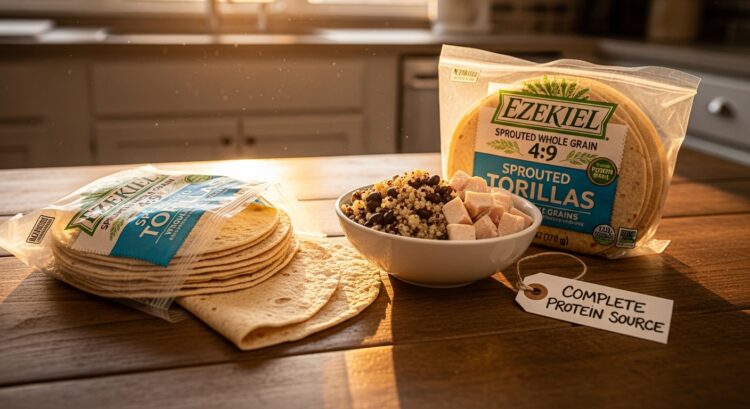Most people don’t realize that their everyday wrap or tortilla could be delivering complete protein with every bite. While traditional flour tortillas offer minimal nutritional value, there’s a remarkable alternative that’s been gaining attention for its exceptional health benefits. Ezekiel wraps stand apart from conventional options because they’re made from sprouted grains and legumes, creating a unique nutritional profile. Understanding what makes ezekiel tortilla products so special can transform how you think about this simple food staple.
Understanding Complete Proteins and Why They Matter
Your body needs 20 different amino acids to function properly, nine of which are “essential” because your body cannot produce them—you must get them from food. A complete protein contains all nine essential amino acids in adequate proportions. Animal products like meat, fish, eggs, and dairy naturally provide complete proteins, but finding plant-based complete proteins proves more challenging. Most grains lack lysine, while legumes are short on methionine. This is where the genius of Ezekiel products becomes apparent.
The Ancient Recipe Behind Modern Nutrition
The formula for these remarkable tortillas comes from a biblical verse (Ezekiel 4:9) that describes combining specific grains and legumes. This ancient combination includes wheat, barley, beans, lentils, millet, and spelt. What ancient cultures discovered through tradition, modern nutrition science has confirmed: combining these specific ingredients creates a complete protein profile. Each component contributes different amino acids, and together they provide everything your body needs.
The Sprouting Process That Changes Everything
What truly sets these products apart isn’t just the ingredient combination—it’s the sprouting process. When grains and legumes are sprouted, they undergo remarkable transformations. Enzymes activate, breaking down compounds that can interfere with nutrient absorption. Protein becomes more digestible and bioavailable. Vitamin content increases significantly, particularly B vitamins and vitamin C. The fiber structure changes, becoming gentler on your digestive system. This process essentially “pre-digests” the ingredients, making nutrients far more accessible to your body.
What Makes Ezekiel Wraps and Tortillas a Complete Protein Source
The secret lies in the synergy between grains and legumes. Wheat, barley, millet, and spelt provide certain amino acids while being deficient in others. Beans and lentils fill those gaps perfectly, offering the amino acids that grains lack. When sprouted and combined in specific proportions, these six ingredients create a complete amino acid profile comparable to animal proteins. Two tortillas typically provide 8-10 grams of complete protein, making them an excellent foundation for plant-based meals or a protein boost for any diet.
How Sprouting Enhances Protein Quality
During sprouting, proteins break down into their component amino acids, making them significantly easier to digest and absorb. Studies show that sprouted grains have up to 30% more bioavailable protein than their unsprouted counterparts. The process also reduces anti-nutrients like phytic acid, which can bind to minerals and prevent absorption. This means you’re not just getting more protein—you’re getting protein your body can actually use efficiently.
Comparing Nutritional Profiles: Ezekiel vs Regular Tortillas
Standard flour tortillas typically contain refined wheat flour, oil, and preservatives, offering around 2-3 grams of incomplete protein with minimal fiber or micronutrients. Ezekiel versions provide triple the protein, four times the fiber, significantly more B vitamins, iron, and magnesium, plus the benefit of complete protein. They’re also free from refined flour, added sugars, and artificial preservatives. The difference in nutritional density is dramatic—you’re essentially comparing empty calories to nutrient-dense sustenance.
Blood Sugar Benefits of Sprouted Grain Products
The sprouting process dramatically lowers the glycemic index of grains. While regular tortillas can spike blood sugar rapidly, sprouted versions release energy slowly and steadily. This makes them excellent choices for managing diabetes, maintaining stable energy levels, and preventing the crash that often follows refined carbohydrate consumption. The combination of complete protein, high fiber, and complex carbohydrates works synergistically to keep blood sugar balanced.
Digestibility Advantages Over Conventional Wraps
Many people who struggle with grain digestion find sprouted versions much easier to tolerate. The sprouting process breaks down gluten and other proteins that can cause digestive discomfort, though these products still contain gluten and aren’t suitable for celiacs. The activated enzymes continue working during digestion, helping your body process the food more efficiently. People often report feeling less bloated and more satisfied after eating sprouted grain products compared to conventional alternatives.
Meeting Protein Needs with Plant-Based Options
For vegetarians, vegans, and anyone reducing meat consumption, finding complete plant proteins can be challenging. These tortillas offer a convenient solution that doesn’t require carefully combining different foods at each meal. Whether you’re making breakfast burritos, lunch wraps, or dinner quesadillas, you’re automatically getting complete protein. This simplifies meal planning while ensuring adequate amino acid intake throughout the day.
Incorporating Them into Balanced Meals
While these tortillas provide complete protein, they work best as part of balanced meals rather than sole protein sources. Pair them with vegetables for fiber and micronutrients, healthy fats like avocado or nuts for satiety, and additional protein sources like hummus, beans, or lean meats for variety. A wrap filled with mixed greens, roasted vegetables, chickpeas, and tahini sauce creates a nutritionally complete meal that’s both satisfying and nourishing.
Storage and Shelf Life Considerations
Because these products contain no preservatives and are made from living, sprouted ingredients, they require careful storage. Keep them refrigerated and consume within their use-by date, typically 1-2 weeks. They freeze exceptionally well—simply separate with parchment paper and freeze in airtight bags for up to three months. Thaw in the refrigerator overnight or at room temperature for an hour before using. Proper storage ensures you maintain their nutritional benefits and fresh taste.
Cost Considerations and Value Assessment
Yes, these tortillas cost more than conventional options—typically two to three times the price. However, when you consider the nutritional density, complete protein content, and health benefits, the value proposition changes dramatically. You’re essentially getting multiple nutritional benefits in one product: complete protein, high fiber, numerous vitamins and minerals, and better blood sugar management. For the nutrition-conscious consumer, this represents significant value despite the higher upfront cost.
What makes ezekiel wraps and tortillas a complete protein source ultimately comes down to ancient wisdom meeting modern nutrition science. The specific combination of sprouted grains and legumes creates something greater than the sum of its parts—a convenient, delicious way to obtain complete protein from plant sources. Whether you’re building a plant-based diet, seeking better nutrition, or simply wanting to make healthier choices, these remarkable tortillas deserve a place in your kitchen.
Frequently Asked Questions
How much protein do these products actually contain?
Typically, each tortilla contains 4-5 grams of complete protein, meaning two tortillas provide 8-10 grams. This compares favorably to many meat alternatives and provides all nine essential amino acids in proper proportions for optimal body utilization.
Can they replace meat as a protein source?
While they provide complete protein, they shouldn’t be your only protein source. They work excellently as part of a varied diet, contributing significantly to daily protein needs, especially when combined with other plant-based proteins like legumes, nuts, and seeds.
Are sprouted products suitable for people with diabetes?
Yes, they’re often better choices for blood sugar management. The sprouting process lowers glycemic index significantly, and the high fiber and protein content help prevent blood sugar spikes that refined grain products typically cause.
Do they taste different from regular options?
They have a slightly nuttier, heartier flavor with a denser texture than white flour versions. Most people find them more satisfying and flavorful once accustomed to the taste, though they’re definitely different from refined alternatives.
Why must they be refrigerated?
Without preservatives and containing living enzymes from the sprouting process, they’re more perishable than conventional products. Refrigeration prevents mold growth and maintains freshness, though freezing extends their life considerably without affecting quality.
Are they appropriate for weight loss diets?
Absolutely. Their high protein and fiber content increases satiety, helping you feel fuller longer. The stable blood sugar response prevents cravings and energy crashes that often derail weight loss efforts. They’re nutrient-dense rather than calorie-dense.
Can children benefit from eating these products?
Yes, they’re excellent for growing children who need complete protein for development. The enhanced digestibility makes nutrients more accessible, and the natural ingredients avoid the additives found in many kid-targeted foods. Most children adapt quickly to the heartier taste.
How do they compare to whole wheat versions?
Even whole wheat tortillas lack the complete protein profile and haven’t undergone sprouting. Sprouted versions offer superior digestibility, lower glycemic impact, higher bioavailable nutrients, and the crucial combination of grains and legumes that creates complete protein.
Are there any people who shouldn’t eat them?
Anyone with celiac disease or severe sensitivity should avoid them as they contain gluten. Those with allergies to any of the six ingredients (wheat, barley, beans, lentils, millet, spelt) should also skip them. Always check ingredients if you have specific allergies.
Can I make these at home?
While possible, the process requires sprouting multiple grains and legumes, drying them, milling into flour, and preparing dough—a multi-day process requiring specialized knowledge. Most people find purchasing them more practical, though home sprouting enthusiasts certainly can attempt it.
















